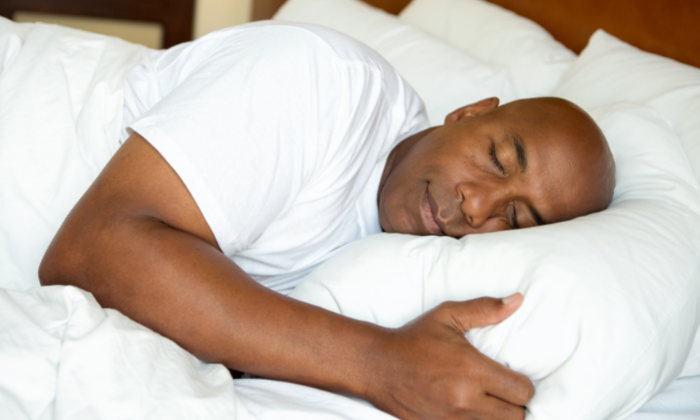In hot weather, it can be very hard to fall asleep. You find yourself tossing and turning in bed late at night, unable to fall asleep, because it’s just way too hot.

Now, whatever the cause, a lack of quality sleep can seriously affect your body and brain. It reduces productivity, impairs creative thinking, and may even go as far as affecting your memory in the long term.
As a result of these, it is important you learn ways to sleep comfortably, even when the weather is hot. Here are a few tips:
1. Keep sunlight out of your room
You want to draw the curtains to your room and keep the sun out of the room. This will ensure your room stays cool during hot days.
This should be done throughout the day so that your room is cool at night. Blackout curtains, which are specifically designed for this, might be your best choice.
2. Don’t let your ice water be too far away
A cool bottle of water or an ice pack can provide relief that helps you sleep in the middle of the night.
3. Try to avoid exercise close to bedtime
Exercise can be very beneficial to ensure that you sleep well, but you must avoid doing it too close to your bedtime.
This is because exercising leads to a spike in your body temperature, which is definitely not good when the weather is generally hot.
3. Take a hot soak
Interestingly, taking a warm bath before bed is one of the best ways to cool down before bed. After bathing, your body temperature drops quickly, you get more relaxed, and you are able to sleep. You should take such a bath before bedtime but not immediately before bedtime.
4. Let the thermostat be at 65 degrees
According to a number of experts, a temperature of 18.3 degrees Celsius (65 degrees Fahrenheit) is optimal for sleeping. Your body keeps its core temperature during sleep by using this thermostat setting.

It's essential to note that each person has different sleep preferences, and a range of 15.5-19.5 degrees Celsius (60-67 degrees Fahrenheit) is considered normal for most people.
5. Get a Fan
A bedside fan can also be a handy tool to help you sleep better. It helps to circulate air throughout your room to keep you cool. Even if you possess an air conditioner, you should consider installing a fan to increase airflow.

6. Find your ideal clothing level
While there is no dictate to what kind of clothing you will feel most comfortable in, you should be aware that thick bedclothes and insulating materials may serve to elevate your body’s temperature.
They may also cause overheating, especially when the weather is hot. Therefore, in all your preferences you want to wear something light.
7. Freeze your pillowcases
You can place your pillowcase in the freezer and then place it on your pillow before you go to bed to keep your head cool.
8. Get the appropriate sleeping materials
Your bed, pillows, and bedding all contribute to how comfortably you can sleep each night. For instance, thick foam mattresses tend to absorb and trap body heat, making them feel overly warm.
In contrast, air is circulated throughout the interior with some other mattresses, using features such as ventilated latex and open coils that ensure you get a cool night's sleep. The same principles apply to pillows where some trap heat and some do not.
In the case of bedding, it is best to pick sheets made from natural fibres as they are better for breathability and comfortable sleep. Examples of natural fibres are bamboo, cotton or linen.

How Does the Heat Affect Our Late Night Sleep
Your body has a very intricate thermoregulation system that functions throughout the day and even while you are asleep. What heat or hot temperature does is that it interferes with this and disrupts your body’s process.
The way your body regulates its temperature is that during the day, your retinas detect natural light and send messages to your suprachiasmatic nucleus (SCN) to ensure you are awake.
As a result, you feel alert because, in response, your body releases cortisol, an alerting hormone. Your body temperature also remains at its normal waking level. During the day, the normal body temperature for most people is 37 degrees Celsius (98.6 degrees Fahrenheit).
However, as soon as the sun sets, your eyes will sense darkness and alert your SCN accordingly. When this happens, your body releases melatonin, the hormone responsible for inducing feelings of fatigue and relaxation. This also lowers your core temperature.
As you sleep, your body temperature decreases through the first two stages of sleep. The first two stages consist of non-rapid eye movement (NREM) sleep. Your temperature will arrive at its lowest when you get to the deepest part of sleep.
However, heat and hot weather will disrupt these processes and increase your body temperature during sleep, forcing you awake or making it hard for you to sleep restfully.
Your body will wake more easily during NREM sleep and this limits the time you spend at other levels of sleep, such as the slow-wave and REM sleep stages.
This further affects all the repair and recovery that your body does during sleep, thereby making you less refreshed and even tired after every night’s sleep.
Wrapping Up
There you have them, some of the essential tips to ensure you get a comfortable sleep, even on hot nights.
Don’t forget, your choice of sleep materials can make all the difference. So get beddings and blankets that are optimised to ensure you have a heat-free, relaxing sleep.
Wondering where to get them? Check out our Cooling Bamboo Bedding Set and our Cooler Weighted Blanket.

